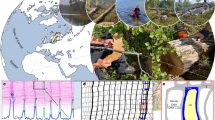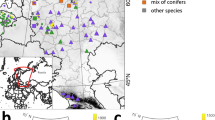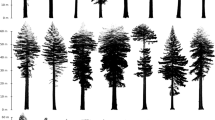Abstract
Evidence is summarised here that trees store a record of atmospheric temperature in their rings. In each ring, the ratios of the stable isotopes of hydrogen and oxygen vary with the air temperature prevailing when the ring was formed. We have shown that the temperature records in three modern trees seem to follow the local mercury thermometer records, and have found that a Japanese cedar indicates a temperature fall of ∼1.5°C in the past 1,800 yr.
This is a preview of subscription content, access via your institution
Access options
Subscribe to this journal
Receive 51 print issues and online access
$199.00 per year
only $3.90 per issue
Buy this article
- Purchase on Springer Link
- Instant access to full article PDF
Prices may be subject to local taxes which are calculated during checkout
Similar content being viewed by others
References
Craig, H., Nuclear Geology in Geothermal Areas, Spoleto, September 9–13 (Consiglio Nazionalle delle Richerche, Laboratoria de Geologie Nucleare, Pisa, Italy, 1963).
Environmental Isotope Data, Nos 1–5, International Atomic Energy Agency; Vienna, Austria, 1969, 1970, 1971, 1973, 1975.
Libby, L. M., J. geophys. Res., 77, 4310–4317 (1972).
Huber, B., Ber. dt. bot. Ges., 53, 711–719 (1935).
Berger, R., Phil. Trans. R. Soc., A 269, 23–26 (1970).
Kigoshi, K., and Endo, K., Chem. Soc. Jap. Bull., 11, 1738–1739 (1961).
World Weather Records, 2, Europe (Environmental Science Services Administration, Environmental Data Services, Washington, DC, 1966).
Huber, B., and Siebenlist, V. G., Abt. I, Ost. Akad. Wiss., 178, 37–42 (1969).
Manley, G., Q. Jl R. Soc., 79, 242–261 (1953).
Manley, G., Arch. Met. Geophys. Bioklim. Ser. A., 9, 3/4 (1959).
Manley, G., Met. Mag., 90, 303–310, London (1961).
Libby, L. M., and Pandolfi, L. J., Proc. Colloques Internationaux (Centre National de la Recherche Scientifique, Gif-sur-Yvette, June 1973).
Libby, L. M., and Pandolfi, L. J., Proc. natn. Acad. Sci. U.S.A., 71, 2482–2486 (1974).
Becker, B., and Siebenlist, V. G., Flora, 159, 310–346 (1970).
Cohn, M., and Urey, H. C., J. Amer. Chem. Soc., 60, 679–687 (1938).
Bergthorsson, P., Proc. Conf. Climate of 11th to 16th Centuries, Aspen, Colorado (National Center for Atmospheric Research, Air Force Cambridge Research Laboratories, 1962).
Kigoshi, K., Proc. 6th Int. Conf., Radiocarbon and Tritium (Washington State University, Pullman, Washington, June 1965).
Air Temperatures for the World (Japan Meteorological Agency, Tokyo, 1975).
Yamamoto, T., Geophys. Mag., 35, 187–206 (1971).
Chu, Ko-Chen, Scient. sin., 16, 226–250 (1973).
Dansgaard, W., Tellus, XVI, 436–468 (1964).
Rittenberg, D., and Pontecorvo, L., Int. J. appl. Radiat. Isotop., 1, 208–214 (1956).
Author information
Authors and Affiliations
Rights and permissions
About this article
Cite this article
Libby, L., Pandolfi, L., Payton, P. et al. Isotopic tree thermometers. Nature 261, 284–288 (1976). https://doi.org/10.1038/261284a0
Received:
Accepted:
Published:
Issue Date:
DOI: https://doi.org/10.1038/261284a0
This article is cited by
-
Rapid decrease of the Labrador Sea’s influence on black spruce ecosystems with distance inland
Communications Earth & Environment (2024)
-
Heterogeneous isotope effects decouple conifer leaf and branch sugar δ18O and δ13C
Oecologia (2022)
-
Climate-Sensitivity Comparisons for Whole Wood, Holocellulose, and α-Cellulose Carbon Isotope Series in Masson Pine
Arabian Journal for Science and Engineering (2021)
-
Stomatal conductance and intrinsic water use efficiency in the drought year 2003: a case study of European beech
Trees (2016)
-
Relative humidity history on the Batang–Litang Plateau of western China since 1755 reconstructed from tree-ring δ18O and δD
Climate Dynamics (2014)
Comments
By submitting a comment you agree to abide by our Terms and Community Guidelines. If you find something abusive or that does not comply with our terms or guidelines please flag it as inappropriate.



